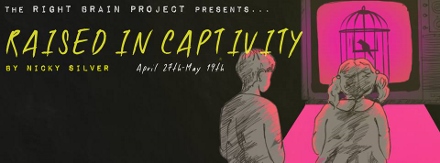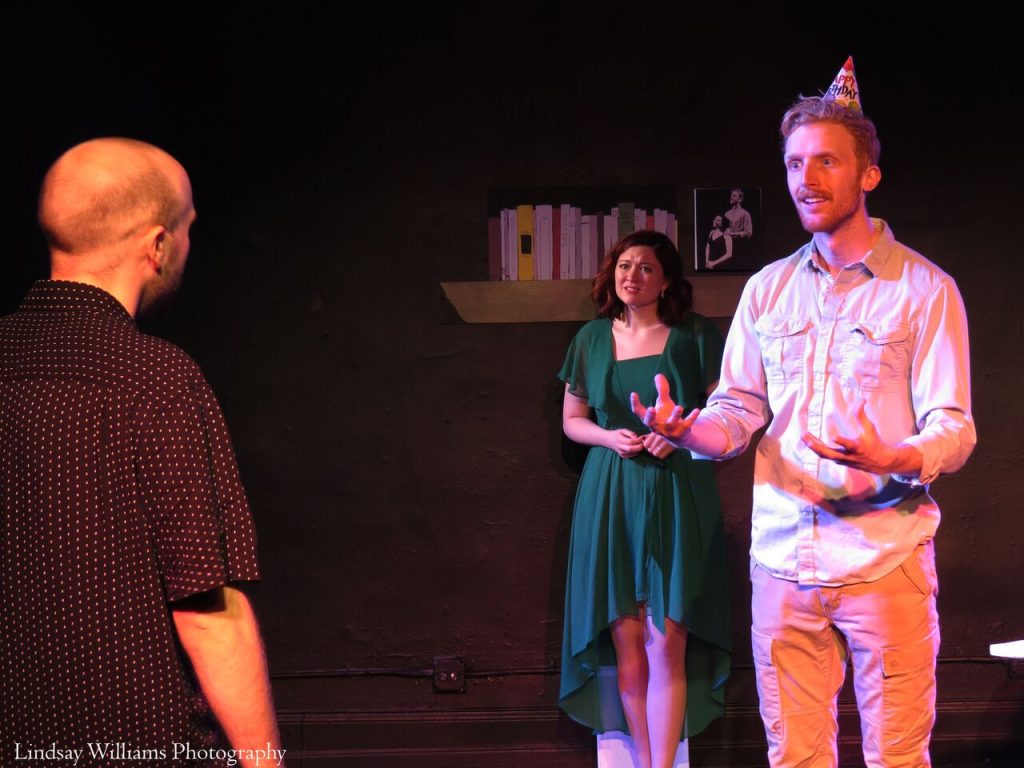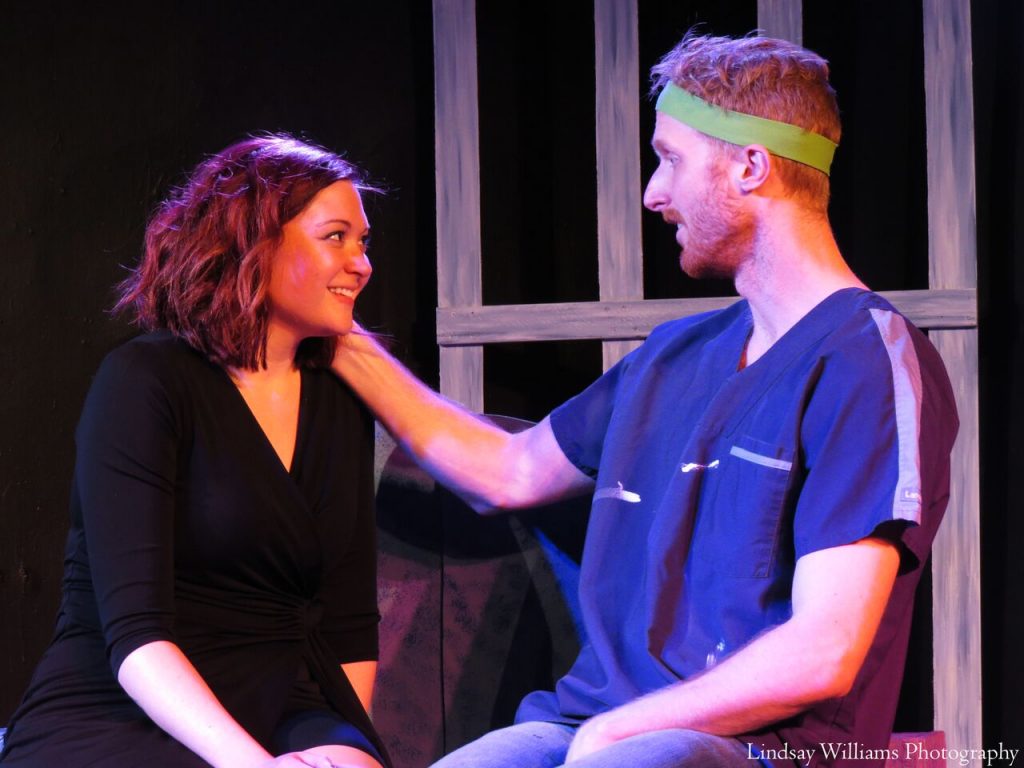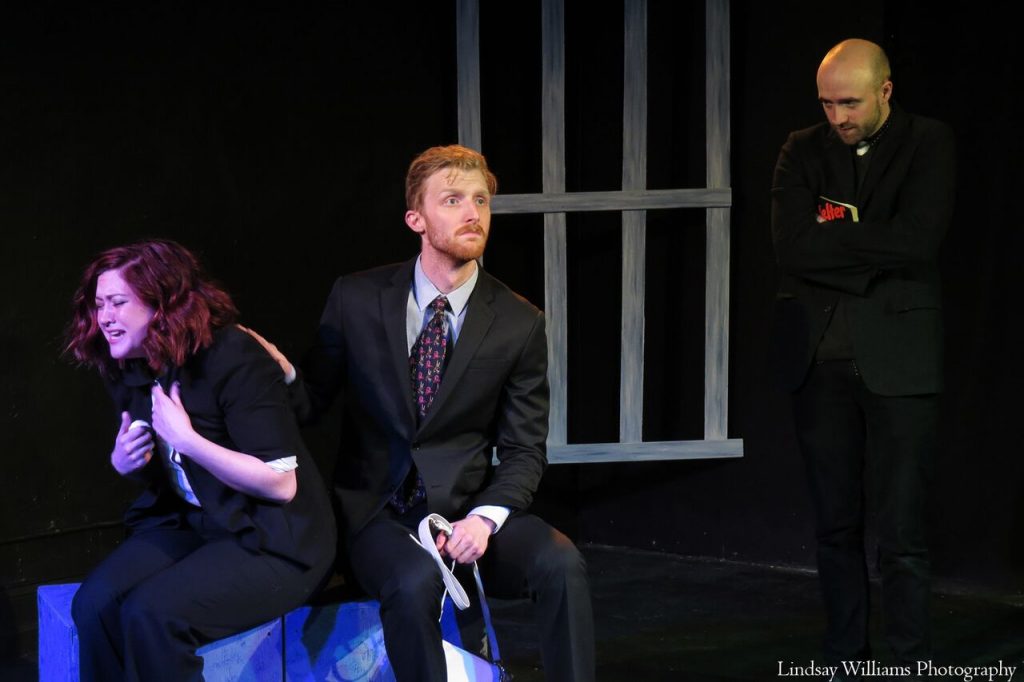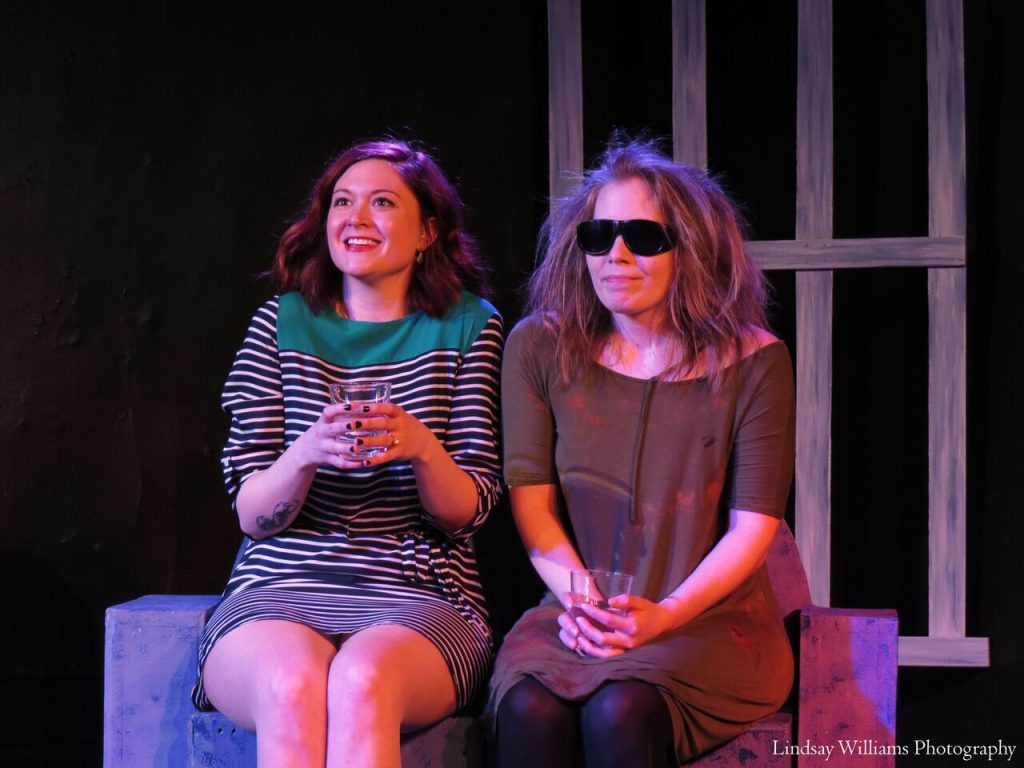“KICK ME” CHARACTERS
Born to be bad, Nicky Silver is an acerbic gay playwright who has employed his outsider status to skewer the American family (Pterodactyls), relationships (The Food Chain), and stereotypes (Fat Men in Skirts). His works aren’t done that often anymore, maybe because even bitterness has a shelf life. But it’s a worthy risk and a theatrical challenge to make us care about characters who either care too much or stopped feeling long ago.
Nominated for an Outer Circle Critics Award and a Drama Desk Award, Silver’s 1995 dark comedy Raised in Captivity is now in a painfully accurate but surprisingly sympathetic revival by The Right Brain Project. The two-act concoction focuses its absurdist lens on the magnificently miserable Sebastian Bliss (a winsomely woeful Joel Collins). He’s a thirty-something gay freelance writer who owes $45,000, suffers from esophageal reflux, and has never been happy since the horrific death of his lover Simon (from AIDS, eleven years before).
Sebastian’s burdens are constantly building, a work in regress. The ironically named Bliss is also recovering from his mother’s untimely death — killed when her own shower head spurted her into eternity. And now he must cope with the unwanted return of his estranged twin sister Bernadette (Hannah Williams, forlorn but hopeful) and her obsessed husband Kip Dixon (Tyler Esselman). She’s neurotically insecure, needy beyond belief, bursting with unprocessed longings.
Kip is a dentist who hates teeth, and decides to paint invisible canvases (when you only paint in white, you can’t make mistakes). Crazed with the prospect of a second chance, and obedient to a non-negotiable bucket list, he intends to run off to Africa to start a new life.
Sebastian’s one confidant is Hillary MacMahon (Liz Goodson, manic and moody), a crazy psychologist who develops a crush on Sebastian so terrible that she blinds herself, wears the same dress for five months, and camps out at the sister’s place, where Sebastian has holed up with only his infant nephew as company.
Sebastian escapes emptiness through a relationship with an appropriately conflicted murderer on Death Row (Vic Kuligoski). “Basically bad,” this loser rejects him hard. When Sebastian tries to enjoy the first two-way sex in over a decade, the hustler he’s “interviewing” stabs him in the throat.
At the end, the siblings are left together to mourn the pain of their lost mother and a terrible secret about their origin. Sebastian can finally grieve for his lost lover Simon — by caring for the newly named baby Simon. (Supposedly, the tyke can walk at only three months but this may only be Sebastian’s latest delusion.)
Silver’s “tragic farce” is just as uncertain as that sounds. This troubled, troubling work alternates between litanies of life-long victimization and poignant depictions of survivor spunk, especially in the final (and, finally, human) tearful confessions. Mostly, Silver wildly clones Christopher Durang’s darkest comedies, dabbling in disaster as he arbitrarily inflicts sufferings on Sebastian with far less purpose than God did Job.
Kathi Kaity’s ensemble tackle their multiple miseries like game gladiators. But ultimately this laundry list of losses can overwhelm even the most sardonic audience. At nearly three hours, Silver’s dark doings take far too long to detonate: This playwright, it seems, never met a quirk he couldn’t chronicle.
Goodson is a force of neuroses as she tears into one catastrophe after another: Her rage against the dying of so much happiness becomes a life force almost strong enough to counteract the playwright’s relentless pessimism. Collins’ Sebastian (“inertia given human form”) and Williams’ guilt-ridden, sadsack sister artfully impersonate “walking wounded” siblings: Their recollected past, oddly enough, feels more real than their present.
Esselman roots the dentist’s assorted demented drives in a semblance of rationality. Playing Sebastian’s boy nemeses, Kuligoski incarnates all the lifelong temptations that have led this guy nowhere. In the first act Laura Jones Macknin makes much of the mother’s posthumous cameo appearance (dictated by the playwright’s need to convey some clumsy exposition).
Even with the promise of spring on the Chicago horizon, audiences will feel taxed to treasure Silver’s plethora of emotional baggage wrapped in gallows humor. You need a higher tolerance than mine for jokes about the blind and hysterical references to squashed cats, dental diseases, AIDS deformities, and throat-slitting. The fact that these six actors confer palpable truth-telling on Silver’s self-punishing, born-again victims is no small triumph of make-believe.
photos by Lindsay Williams
Raised in Captivity
Right Brain Project
Frontier, 1106 W. Thorndale
ends on May 19, 2018
for tickets ($15-$20), visit Raised in Captivity
for more info, visit Right Brain Project
